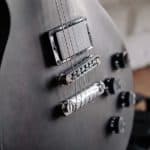Electric guitars are simple instruments.
Just connect the guitar’s cable to the amp, tune the instrument properly, and you’re all set to create wonderful melodies.
That is unless you have a guitar with active pickups.
Active pickups are not that simple. They need a 9V battery to function.
So, you would need the guitar’s cable, the amplifier, and, on top of that, a battery.
It’s a bit of a daunting task, don’t you think?
Well, it might be. But worse than needing a battery to power a guitar, is lacking the battery.
And worse still, is having the battery, but dried out!
But is it really that bad? What happens when the guitar battery dies?
If your guitar battery dies, then you cannot power the guitar’s pre-amp, and the instrument won’t output any signal. Active guitar pickups need an extra source of power to function properly. If this source is dried out, then you cannot boost the guitar’s sound to a usable level.
Does your guitar have active pickups? In that case, you’re in the right place.
We’ll discuss not only how to prevent this problem, but also how to spot the warning signs before it occurs.
Why do some guitars have batteries?
Certain guitars require batteries because of the type of pickups they have.
If a guitar’s pickup is active or piezo-electric, then the instrument needs batteries to work properly. This is because batteries grant a boost to the circuit to modify signal and sound.
In the case of passive pickups, there’s no need to use batteries. After all, passive pickups create their own electric energy, so an external source would be unnecessary.
On the contrary, active pickups are built around an active circuit that, as we already mentioned, boosts the signal.
This circuit requires an external source to work properly. More specifically, it needs a 9V battery.
Now, let’s talk about piezo pickups. These are not too different from active pickups, since they also have a preamp built in that needs an external power source to function.
However, they are most common in acoustic guitars. You may find an electric guitar with a piezo pickup but is not that common.
Piezo pickups are called that way because piezoelectricity is a type of electricity that takes place on solid-state materials (glass, cement, crystal, advanced ceramics, thin film devices).
So, to sum it up, active and piezo pickups need external batteries to work and boost their signal.
What will happen if your guitar battery dies?
You may have one of these pickup models built-in your guitar.
If that’s the case, you might have struggled with dead batteries.
But if you haven’t yet, then you will. Is that too bad?
Fortunately, it’s not. Batteries run out of power eventually, just as any normal battery for any other device.
If the 9V battery in your guitar dies, then you won’t be able to get any signal. As a result, it will be impossible to provide energy to the active circuit, and because of that, it won’t boost the signal.
The solution to this is quite simple. Just replace the battery with a brand-new one.
Can a dead battery damage your guitar in any way?
Most often than not, a dead battery won’t cause significant damage to your instrument or circuits.
However, there are certain occasions on which battery acid may leak. This could interfere with electronics and any other circuit inside the guitar and the pickups.
Take it easy. It only occurs if you force the battery too much and never change it.
One way or another, it is wise to regularly replace the 9V battery every two years or less.
That way, you avoid this acid-leaking issue, and you prevent running out of power during an important live presentation.
Does this also apply to bass guitars?
This occurs with certain bass guitars as well. Of course, we’re referring to bass with active pickups built-in.
Once again, the battery gives power to the pre-amp, affecting the signal and giving tighter control over the EQ settings.
Being able to boost the signal is one of the reasons why people choose a bass guitar with active pickups.
Not to mention, it grants overall better control over the instrument and the settings.
Most bass guitars won’t output any signal with a dead battery.
Do guitar batteries die suddenly?
Guitar batteries tend to “warn” before drying out completely.
Some batteries could run out of power all of a sudden, but it’s a rare case.
Below we’ll describe the warning signs you need to notice, so you avoid any regrets.
How to know when your guitar battery is about to die?
Your guitar will tell you when its battery is about to die.
The most noticeable sign is in the volume. The guitar’s volume will decrease as if it’s lacking energy (which in fact, it is).
After that, some unbearable, blurry, and distorted sounds will come out, all the while it maintains its low volume.
Finally, the battery flat-out dies completely.
Another way of knowing that a battery is about to stop providing power is simply by calculating time.
That is to say, if you’ve been playing with the same 9V battery for more than two years, then it’s about time to replace it.
Batteries last a lot of time, but everything has its limit.
You might argue that yours is still working flawlessly, despite having bought it two years ago.
Don’t test your luck. It will definitely run out of power sooner or later.
Better to be prepared.
Always carry spare batteries on your gig bag
You must be careful not to run out of power in the middle of a relevant act.
You might be recording at the studio, rehearsing with your band, teaching an online lesson, or playing a live show.
In any situation, active pickups without a battery serve no purpose. You need both an amplifier and a pre-amp (with its charged battery) built-in in the instrument.
It would be a shame to stop your activities just because of a silly, easy-to-replace 9V battery.
Our advice is to always be prepared. Carry a replacement battery whenever you go.
You can leave it in your gig bag, guitar case, or even your pockets!
Truth is, you should always take with you a set of spare strings, picks, and guitar cables. And, if you happen to play with an active pickup guitar (or piezo pickup), then a spare battery is a must-have too.

Hello there, my name is Ramiro and I’ve been playing guitar for almost 20 years. I’m obsessed with everything gear-related and I thought it might be worth sharing it. From guitars, pedals, amps, and synths to studio gear and production tips, I hope you find what I post here useful, and I’ll try my best to keep it entertaining also.





